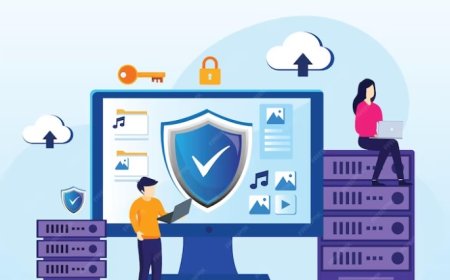Top 10 Cyber Security Principles for Business
The top 10 cybersecurity principles for businesses to protect sensitive data, ensure compliance, and mitigate cyber threats effectively.

Cybersecurity is a basic business need in today's fast-paced digital world, not just a technical issue. Having worked in cyber security for more than 3 years, I have direct experience with the effects of a poor security framework. Threats to a company's operations, finances, and reputation are constant in today's business environment. Even well-established businesses are frequently faced with cyberattacks due to not using basic cyber security ideas. Understanding and implementing these core ideas is essential to ensuring that your company is not exposed.
These cyber security principles give companies a road map, establishing a methodical strategy that helps in both preventing and handling cyber-attacks. Every principle adds durability and lowers the chance of breaches by acting as a layer of security. Let's go over the top ten cyber security principles that all businesses, regardless of size, should follow to effectively protect their operations.
What is Cyber Security?
Basically, cyber security refers to the processes, tools, and methods used to protect digital networks, systems, and data against threats including cyberattacks, illegal access, and data breaches. These security measures cover everything from user access control to traffic monitoring. Cybersecurity is essential for maintaining the availability, confidentiality, and integrity of vital information because modern businesses depend significantly on data.
Technology is only one aspect of cyber security. It also involves developing a security-conscious culture in the company, where everyone knows how important information protection is. Cybersecurity covers a wide range of tasks essential to a company's existence and prosperity, from safeguarding customer data to ensuring business continuity.
The Importance of Cyber Security in Business
These days, cyber security is important for enterprises. Businesses are facing more and more cyber threats as cloud solutions and digital platforms become a trend. According to surveys, businesses are the target of cyberattacks on average every 39 seconds. A successful breach may result in a variety of consequences, including financial losses, damage to reputation, and legal action.
Cybersecurity in the corporate setting protects trust in addition to data. Employees, partners, and clients must have faith that private data is being handled safely. This trust is maintained through putting strong cyber security principles into practice, which helps businesses in preserving their competitiveness and reputation. Investing in cyber security helps businesses avoid cyberattacks and recover without experiencing major delays.
What Are the Principles of Cyber Security?
To help organizations create an organized protective plan against cyber threats, the principles of cyber security are essential guides. These guidelines address topics like data management, access control, and risk assessment. By following these guidelines, companies have a proactive strategy for security as opposed to a reactive one.
The top 10 cyber security principles listed below may change the way your company handles security.
Top 10 Cyber Security Principles for Businesses

1. Risk Management and Assessment
Understanding potential risks is the first step in any successful cyber security strategy. Finding weak points in the organization's digital environment is made easier by carrying out a risk assessment. This process entails assessing resources, understanding the possible effects of different risks, and figuring out what amount of risk is acceptable. Choosing risks after they have been recognized enables companies to allocate resources efficiently.
Because the danger landscape is always changing, regular risk assessments are essential. Businesses may stay ahead of new risks and make sure their security strategies are still effective by regularly conducting these assessments.
2. Access Control
Limiting who can view or interact with particular data or systems requires access control. It entails setting up a system in which people can only access the data required for their positions. This idea reduces the possible damage from insider threats in addition to lowering the chance of intentional leakage of information.
One of the best strategies is role-based access control (RBAC), which distributes access permissions according to job responsibilities. Businesses can reduce vulnerabilities and stop unwanted access by restricting rights, particularly in the case that an employee account is compromised.
3. Data Encryption
Sensitive information is protected via data encryption, which transforms it into a format that only authorized parties can view. To put it simply, encryption makes sure that without the decryption key, data will remain unreadable even if it is intercepted by a harmful organization. It is essential to encrypt data while it is being transmitted and while it is being stored.
For companies handling financial information, proprietary data, or personal customer information, encryption is very important. Data protection laws frequently order that such data be encrypted to prevent expensive breaches.
4. Regular Software Updates and Patch Management
One of the most frequent points of entry for cyberattacks is outdated software. Updates that fix known vulnerabilities are frequently released by software providers; if these updates are not installed, computers may become vulnerable to attack. To reduce vulnerability to threats, patch management entails monitoring these updates and implementing them as soon as feasible.
Establishing an updated schedule ensures that no software is left vulnerable for an extended period. To cut down on human error and maintain system updates, businesses can also think about automating their patch management procedures.
5. Employee Training and Awareness
The first line of defense against cyberattacks is frequent employees. Yet, one of the biggest reasons for security incidents is still human error. Many incidents can be avoided by teaching staff members how to spot phishing emails, understand safe online practices, and manage sensitive data properly.
Employee knowledge and readiness can be raised through frequent training sessions and simulated phishing exercises. Businesses can reduce the likelihood of careless breaches by encouraging a security-conscious culture that empowers their workforce to actively participate in cyber security.
6. Incident Response Planning
Cyber incidents can still occur without effective protective measures. The actions a company should take in the case of a security breach are outlined in an incident response plan (IRP), which enables a prompt and efficient response to minimize harm. Identification of the attack's source, incident protection, threat removal, and system recovery are usually included in an IRP.
In addition to speeding up recovery, a well-crafted incident response plan shows partners and customers that the company can manage cyberattacks. Periodically testing and updating the IRP is essential to ensuring its efficacy.
7. Network Security
The goal of network security is to prevent unwanted access to the company's digital infrastructure. Common techniques include using intrusion detection systems (IDS), virtual private networks (VPNs), and firewall implementation. In order to spot and address questionable activity, network security additionally involves constant traffic monitoring.
Only authorized users can access the company's systems due to proper network security measures. Companies need to adopt a zero-trust strategy in which devices and users are constantly checked before being granted access.
8. Regular Audits and Compliance Checks
To assess how well cyber security measures are working, audits are essential. Regular security audits allow companies to find vulnerabilities and implement the required fixes. In contrast, compliance checks ensure that the company complies with legal and industry standards, including GDPR and HIPAA.
Compliance with strong data protection laws is essential for industries. Serious fines and harm to one's reputation may arise from breaking regulatory requirements. Businesses may remain proactive and accountable in their approach to cyber security by using audits and compliance checks.
9. Backup and Recovery Planning
In the case of a technical issue or cyberattack, data backups are essential for preventing data loss. To ensure that activities can be quickly resumed, a backup and recovery plan entails testing recovery procedures and regularly storing copies of important data. For protection against localized attacks, these backups need to be safely kept off-site or in the cloud.
Planning for recovery reduces downtime and enables companies to resume operations with minimal disruption. A reliable backup system is important for companies of all sizes because it prevents data loss and promotes continuity.
10. Third-Party Risk Management
Many companies work together with outside partners, suppliers, or vendors who might have access to private information or systems. It is important to carefully manage these relationships since any security flaws in third-party systems could put the company at risk. It's important to carefully evaluate these partners, make sure they conform to strict safety standards and continually evaluate their procedures.
Businesses reduce the risk of external vulnerabilities by requiring third-party vendors to keep to security requirements. Security terms in contracts can also be used to hold partners responsible and ensure compliance.
Benefits of Implementing the Principles of Cyber Security
Protects Sensitive Data: Prevents theft or illegal access to client and company data.
-
Ensures Regulatory Compliance: Helps companies follow industry standards, preventing legal problems and possible penalties.
-
Improves Client and Partner Trust: By demonstrating to clients and partners that data privacy is a top priority, you may foster greater trust and loyalty.
-
Reduces Operational Disruptions: Provides stability by lowering the possibility of cyber events that can disrupt regular corporate operations.
-
Boosts Productivity and Saves Money: Prevents expensive data breaches, which lower recovery costs and downtime.
-
Promotes a Security-First Culture: Encouraging staff to stay watchful reduces the possibility of human mistakes and fosters accountability by promoting a security-first culture.
-
Protects Brand and Reputation: Shows a proactive approach to security, improving the company's standing in the marketplace.
-
Supports Sustainable Growth: Businesses can confidently grow in the world of technology without taking unnecessary risks when they have an established cyber security foundation.
These advantages give businesses a strong platform on which to grow safely in a world that is becoming more and more digital.
Key Cyber Security Statistics

-
The average cost of a data breach is $4.45 million, according to a 2023 IBM analysis, demonstrating the financial toll that cyber events take on companies.
-
According to Cybersecurity Ventures, by 2025, the yearly cost of cybercrime might exceed $10.5 trillion worldwide.
-
Phishing is still a common concern; in 2022, phishing attacks were responsible for over 36% of all breaches.
These numbers demonstrate how urgent it is to give cyber security principles top priority, particularly given the rising operational and financial expenses associated with cyber events.
Frequently Asked Questions
1. What are the principles of cyber security, and why are they important?
The basic principles of cyber security help businesses in safeguarding their digital assets. Organizations can lower risk, safeguard private information, and maintain business continuity by following these guidelines.
2. How can small businesses implement cyber security principles on a limited budget?
Employee training, data encryption, and frequent software updates are examples of inexpensive solutions that small companies can put into place. Without using a lot of resources, these simple actions can provide a strong security foundation.
3. Why is employee training essential for cyber security?
Workers are essential in preventing incidents. The risk of cyber risks can be considerably decreased by teaching children how to spot phishing scams, create strong passwords, and manage sensitive data appropriately.
4. How often should a business update its cyber security protocols?
Frequent updates are necessary. Every year or whenever there are major changes in the threat environment or structure of operation, businesses should review their policies.
5. How does data encryption enhance cyber security?
Sensitive information is protected by encryption, which prevents unauthorized people from reading it. This protection is essential for stopping data breaches, especially when it comes to data that is in transit.
Businesses in today's digital economy are no longer free to choose not to implement cyber security standards. Businesses can lower financial risks, gain a competitive edge by building trust, and safeguard themselves against emerging cyber dangers by giving priority to these 10 principles. Implementing cyber security as an essential business function ensures both the continuity of operations and the protection of important data.
Businesses may gradually create a strong security architecture that responds to both present and future threats by beginning with easy measures like access control and training for employees. A safer, stronger company can be achieved by investing in these principles, which provide a sustainable means of managing the complexity of today's cyber threat situation.





























































